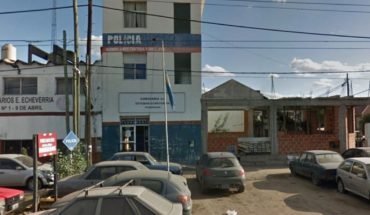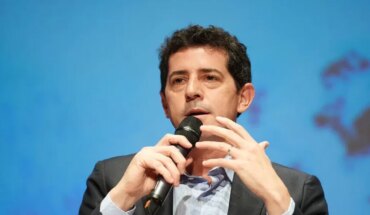Mario Desbordes was seen entering Congress on Wednesday, September 7, to meet with Francisco Chahuán, the president of his party, National Renewal (RN), and with a group of parliamentarians including the head of the caucus, Andrés Longton; the deputy head of the bench, Sofía Cid; and others close to her such as Hugo Rey, Jorge and Eduardo Durán, Érika Olivera, and the senator and head of the committee, Paulina Núñez. A day later a group of independent senators of RN expressed their doubts about the possibility of electing a new Convention, sliding the possibility of appointing in its place a committee of experts, a proposal that worries in sectors of the Rejection that had compromised a participatory and citizen space.
One of those who have expressed concern about these statements is Desbordes himself, who has been recognized as a rebel of the national directive of his collectivity (he has gone so far as to say that “the logic of the RN directive is one of brutal sectarianism”). Far from wanting to enter into controversies, he explained that for him “the most important thing is to help Francisco Chahuán and also talk with those closest to him so that we keep our word.”
A group of independent senators from the National Renewal caucus announced that they will not support a Constitutional Convention. Doesn’t that position more closely resemble what was put forward by the Republican Party and the People’s Party? That the way is a Constitutional Convention, is it just the opinion of the RN leaders? It seems not to be shared by parliamentarians.
This group of parliamentarians, especially those in the toughest position, could have spoken before the campaign. They didn’t. Why? Because they knew that the position they had favored the Approve. Hundreds of thousands of people voted Reject for the commitment made by Chile Vamos to reach a good new Constitution through a democratic mechanism. We committed that. I would remind them, especially the senator of La Araucanía -Carmen Gloria Aravena- and Senator Juan Castro, that there is not only one second in the strip, there is not a single advertising piece that does not say “reject quietly, because then we are going to go to a new and good Constitution”. We reiterated again and again that the body was going to be democratic, always bearing in mind that we were not about to repeat the experience of the independents and the way in which the reserved seats were allocated. If the expert committee is going to be chosen by the people, I don’t see the problem. They have not been specific in this. If the political committee is going to be handpicked by the parties, it seems to me that it is a breach of the word pledged in the campaign.
Francisco Chahuán, helmsman of National Renewal, conditioned his meeting with the President for the lack of coordination in the change of cabinet, when the fact was similar to the change of former President Piñera when he appoints Gonzalo Blumel in Interior, after Falling at the last minute Felipe Ward. Chahuán changed his mind when he received a call from Ana Lya Uriarte of the Segpres. Do you think there is a lack of coordination on the right as well? When you have the ball, the probability of getting entangled with it is no less. Do you think that can happen to the right?
-There is lack of coordination on both sides. Let us not forget that regarding the constituent proposals there is no single one since Apruebo Dignidad, they have not been able to agree. Nor do they have the same vision of the cabinet change I approve dignity as Democratic Socialism. I believe that National Renewal will always be at the table of conversations, which is what matters. And the party’s disposition is to fulfill the commitment to reach a good and new Constitution.
–So what do you think of the signals the right has given this week? Javier Macaya, helmsman of the UDI, said that “there are issues where we have deep differences with the Government and they are evident. But the constitutional itinerary is 50, 100 years and cannot be thought of in the short term.”
-Javier Macaya is right. What we have to do is absolutely separate the discussion of the reforms, the discussion of the different bills, government initiatives, the evaluation that we make of the management of the Government, with the work that is being done to reach a new constituent process. The Chile Vamos coalition has every right to raise a constructive but firm opposition on issues that we think are not right. Am of those who believe that citizens have already expressed themselves in the plebiscite against some aspects that will come in the Government’s proposal on health and pensions. But these points must be made in parallel to the talks for a new constituent process, that they are not anchored, that one thing does not hinder the other.
In a clear criticism of your sector, you wrote recently that the faces of the right that were hidden during the campaign “today appear to attribute a result that was citizen, to be the interpreters of the electorate and to pretend that Chile Vamos does not fulfill the word committed in the campaign.” To whom was that message specifically addressed? And what is the probability that Chile Vamos will be dragged by Republicans, who clearly with this result do not want a new Constitution?
-I addressed it to those who in a very rude way immediately started a campaign on Monday, with sheets made by graphic designers, where we were treated as scoundrels, traitors and a long etcetera. They were even tweeted by some Republican-elected lawmakers. I respect the opinion of this collectivity, they want to leave everything as it is, they are within their rights, but I cannot accept that they try to impose their opinion with disrespect, and even thuggery. Republicans have an enormous capacity to take over social networks using technological tools, and that generates in some sector of the center-right the idea that there is a very massive position regarding not making changes to the Constitution. It’s a mirage. Now, what lies behind this? I think the two extremes. There is also the Communist Party that once again insists on imposing the same rules that failed in the previous Constituent Assembly, and that knows that they will be rejected.
Today the electorate has given a very clear sign of an orientation to moderation, towards the center, and that of course makes the panorama of the extremes difficult. And that underlies above all in the effort of this hard sector of the right to oppose a new process, because they know that it could go wrong. Not so to the moderate sectors.
On this point, the constitutional point, are the coincidences or divergences with Republicans greater?
My position is divergent from that of this group a long time ago. They do not want a new process, it is legitimate, but above all I am uncomfortable with their way of doing politics. I don’t like the disqualifying form. Because, in addition, what it seeks, along with polarization, is to undermine the institutions. That is why also from Republicans some announced a fraud of the Servel, for example. It is a libretto that is used in many countries.
-But if they have so many differences with Republicans, how is it understood that the entire right, the most extreme and the most moderate, squared behind a Republican, like José Antonio Kast, in the last presidential elections? If they have already done so once for electoral convenience, what prevents such a situation from happening again?
At the front we had a coalition made up of the Communist Party, leaders like President Boric himself who announced impunity for the criminals who set fire and looted, who soiled the social explosion. I value the peaceful part, the hundreds of thousands of people who demonstrated. When you had at the head a coalition that stood in solidarity with (Héctor) Llaitul and the CAM until before assuming the Government, with quite extreme positions in some cases, one had to choose. Kast was not my candidate in the first round, I supported Sebastián Sichel, and then in the second round we had to choose.
What are the times that, according to you, should be printed in the constitutional process?
-I hope we will have something clear within the month of September or the first days of October. I believe that citizens may be tired of these processes, but also of the eternal fight over whether or not the Constitution is legitimate. I believe that the vast majority of Chileans want a new Constitution. Therefore, citizens would agree to a process that is democratic and that corrects the mistakes that were made in the previous one. What I see is that in the previous process the lists of independents managed to elect just the people who generated the greatest discredit to the Convention. It was a bad experience, I would maintain the general rule that applies to all elections in Chile. It is that the independents go with quotas within the party lists.
Do you think that we should go straight to the Constitutional Convention, or that before there is a plebiscite with the possibility of other models, such as a mixed commission, or one with experts?
-The ideal is to go straight to aa formula in which they are elected representatives. They may be the group of experts, but elected. If it is agreed, by the parties that are talking, that there will first be a plebiscite that consults the mechanism, it can be. But we are going to start producing an electoral calendar similar to what happened to us before and enter a dynamic where the election of the constituents will be months away from the municipal one. And that’s exhausting. I think the best thing for Chile is for this to be separated from the other electoral processes.
And why has Chile Vamos not been clearer about this and has not spoken categorically?
-Because there is no agreement inside. I appreciate that Democratic Socialism has a proposal that seems to me to have many reasonable things. But the other coalitions, including Apruebo Dignidad – Frente Amplio, Partido Comunista and Federación Regionalista Verde Social – still have no agreement, and that’s what the talks are now for.
-In the most reserved conversations between members of Chile Vamos admit that the decision of a mechanism to follow the constituent process depends on delivering certainties and the first would be to clear the economic barriers that the pension and tax reform may put in the way. Why are these projects anchored to the continuity of the constituent process?
“I haven’t heard that in conversations. And on the contrary, what I have proposed is that they have to go in separate lanes. Discuss the constituent process at a table, and listen to the Government’s proposal on pensions, tax and health, in different tables. However, people want to own their pension funds and inherit them to their families if they die at all. Those things I think were settled in the plebiscite. I hope that the government does not insist on questioning them, on pretending that the universal health plan will only be offered by Fonasa, that the people categorically rejected.
So you don’t think that the continuity of the constituent process will be used as a bargaining chip to negotiate with certain aspects of tax and pension reform?
-I hope not, I think it is not correct, and I think we would be missing our word if we mixed the issues. Because in addition, the government does not have the votes to make the reforms at will. He has to talk. So why mix things up.
At different times, such as before the plebiscite, he said that he was evaluating resigning from RN, and that a political project could be made with center-left democratic forces. He has also said he has held talks with DC Senators Matías Walker and Ximena Rincón. What do you think of a referent in which Amarillos por Chile, ex DC and ex RN are present? Is it possible in Chile to build a center-center referent?
-I have said that I am evaluating my continuity in National Renewal, however, today it is not an issue, because I think we have to concentrate on fulfilling the constituent path for citizens. That is why we have not made an evaluation of the other, it would be a small group, nor is it about half of RN leaving. In the event that I leave the party, or if I stay, we must make an alliance towards the center, in the direction of the center-left, with whom we were for the plebiscite. When I referred to the senators, I was referring to the bills that were ongoing. I have not spoken to them about possible coalitions, but I have spoken with some Members of the Christian Democrats.
-What should be the focus of this referent?
I think that a political project has to look at the great social reforms. Under the same umbrella can be liberals and conservatives, and have the right to vote here and there the different ones that have a value dye. But the important thing is that it converges in social, common, collective projects, which are oriented by what is the social market economy, and under a principle of solidarity as a guiding axis.
–Beyond a hypothetical new referent, in 2021 he said that “the logic of the RN directive is one of brutal sectarianism.” To which he added that “I do not know if Chahuán or Schalper generate the credibility that a moment like this requires.” However, he arrived at The Congress on Thursday to meet with Chahuán. What changed? Do you think that National Renewal should take a more prominent role in the talks with the Government?
I remain critical in many details of the directive. Three or four months ago I spoke at the General Council, I asked that we support a political vote that made clear the position of National Renewal to be for a new process. In that General Council I asked for support for the direIn addition, I expressly said that I considered postponing our differences as leaders, because Chile was the most important thing. And I have maintained that position for months, and in that context is the conversation with Francisco Chahuán, it is not that I have become part of the directive, nor in the defender of the directive. Because that’s not the subject today. The central thing is that RN was for the Rejection of the text and continue with the constituent process, we said it, we wrote it like this, we swore to the people, in all the debates we said the same thing, and now the center of the discussion is to fulfill that commitment.
What role do you want to play in the continuity of the constituent process? Would you be willing to run for a Constitutional Convention?
-My role, without having any position, and in that we must be careful, is to support the directive, and that is why I want to support Francisco Chahuán. Here the leadership has to be done by the president of the party, together with the heads of senators and deputies. And it’s not easy in RN, which is a very diverse party. We have already seen that there are parliamentarians who have not waited for an internal agreement, and have come out to propose formulas. Some of them that even abort the process. For me the most important thing is to help Francisco Chahuán and also to talk with those closest to me so that we keep our word. Then we will see which process opens, if at all. I hope so, I don’t want to put myself in a scenario where the right does not keep my word. I think we all have to share the same disposition that a person of the stature has, of the stature of Don Ricardo Lagos, who I admire, if he is willing to help, what is left to the rest of us. Where? In his minute I will see it.
-If it is like conventional…
-We have to see that when the agreement occurs, the urgent thing today is to concretize it. Personally, I have told my entourage, I would like to return to Congress in three more years. I think I have the citizen support for that, it is what I feel on the street, I cross the center of Santiago without any problem, in the polls I have a positive evaluation, and a low level of rejection, which probably goes up now by the hardest people on the right, but that is not my electorate.
Javier Macaya and Diego Schalper held talks with the same President prior to the plebiscite. Macaya was the only head of Chile Vamos who did not hesitate to attend Tuesday’s meeting in La Moneda. Do you think it is Macaya who from Chile Vamos is showing more clarity with following the process and is consolidating itself as the intermediary with the Government?
-That information that the media have put on the table about the conversations is different from what they have made me see. From the Government they have assured me that they have also spoken with Francisco Chahuán. Of course the secretary general of RN -Diego Schalper- can communicate with the government, it is not under discussion. But it is not true that the party president has not been part of the discussions or has no direct line to the government. In that context I recognize the work of Macaya, I think he has been a tremendous contribution in the political discussion, I know him very well, and I think he is a powerful leadership within Chile Vamos. What will be the historical judgment of what is to come? I hope it’s good. I’m not thinking today about whether it’s going to be an RN or a UDI that is positioned because it achieved this. It is not a matter today whether or not this favors someone for a presidential election for which there is too much to go, no one who can appear as presidential at this point ends up reaching the end of the race, therefore, I do not think javier or anyone is in that logic.
-The Government proposes a pension reform where the 6% applied to the employer goes to common funds. Sebastián Piñera created the Universal Guaranteed Pension law that provides a maximum amount of $193,917 per month. Parliamentarians of the UDI have opened up to a percentage of solidarity. Here I have two questions: Do you agree that a person is not enough to live on $ 193,917 per month? Why do you appear arguing against having a solidarity fund?
-Let’s recognize that before the Government of Sebastián Piñera the guaranteed pension was less than one hundred thousand. There is a gigantic advance in the Piñera Government in terms of the solidarity pillar, and the Guaranteed Single Pension (PGU). My father has a pension of 200 lucas, of course I am worried that his pension will improve. I live that in my family, it is not something that they tell me in a study of I do not know what center of thought. We must build a solidarity pillar, it must be intergenerational, leaving aside this nostalgia for the distribution system as a solution, respecting the property of the fondAnd build this pillar of solidarity with general taxes, and make solidarity with the 6% of those who earn the most.
Follow us on





